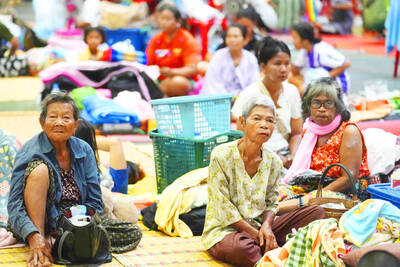Libyan leader Muammar Qaddafi’s drive to create a “union government” for all of Africa has instead heightened divisions on the continent, forcing an extension of a summit yesterday to resolve the spat.
The African Union (AU) elected Qaddafi to lead the bloc on Monday, despite deep reservations among many members over his call for a “United States of Africa.”
But as the 53 members were meant to wind up their three-day summit, the dispute widened as they debated a report on how to reform the continental body.
Qaddafi walked out of the talks without saying anything, and moments later the other leaders left around 3am with an agreement to resume debate later in the day.
“He understood that he lost, that why he left like that,” one African diplomat said, speaking on condition of anonymity.
Publicly, African leaders tried to put a positive spin on it.
“He didn’t walk out, he just got tired,” Liberian President Ellen Johnson-Sirleaf said.
“We had very important things to discuss. A very rich debate. We will take it up again tomorrow morning to close,” Senegalese President Abdoulaye Wade said.
The summit had already agreed to expand the mandate of the AU Commission and change its name to the AU Authority, but the details of that change appear to be the focus of the dispute.
South African President Kgalema Motlanthe said in a joint interview with Agence France-Presse and his nation’s SABC television that proposals for strengthening the AU would be considered only over the next three months.
“The aim is to strengthen and expand a bit on the functions and responsibilities of the Authority,” he said.
“The executive council tabled proposals and actually requested to be accorded three months within which to look at the exact nitty-gritty of this AU Authority,” he said.
“There is an acceptance that the end goal of the founding fathers of the OAU [Organization of African Unity] and the AU was that Africa would be united. A day will be arrived at where there will be a single authority in charge of Africa,” Motlanthe said.
“There is also a recognition that the route will be a long route,” he said.
During the summit, the tensions with Qaddafi were palpable. Ugandan President Yoweri Museveni proposed turning the AU leadership into a troika, which would mitigate Qaddafi’s influence in a role that already has little real power.
“Africans are polite, but deserve respect,” Museveni told him, according to one participant in the talks.
He then got up, whispered something in Qaddafi’s ear and tapped him on the shoulder as he left. A few minutes later, Qaddafi left, the participant said.
Qaddafi has long looked at the AU as a way to boost Africa’s international profile, as well as increase his own standing.
However, leaders like Museveni are reluctant to see Qaddafi become the face of Africa in international arena.

FOREST SITE: A rescue helicopter spotted the burning fuselage of the plane in a forested area, with rescue personnel saying they saw no evidence of survivors A passenger plane carrying nearly 50 people crashed yesterday in a remote spot in Russia’s far eastern region of Amur, with no immediate signs of survivors, authorities said. The aircraft, a twin-propeller Antonov-24 operated by Angara Airlines, was headed to the town of Tynda from the city of Blagoveshchensk when it disappeared from radar at about 1pm. A rescue helicopter later spotted the burning fuselage of the plane on a forested mountain slope about 16km from Tynda. Videos published by Russian investigators showed what appeared to be columns of smoke billowing from the wreckage of the plane in a dense, forested area. Rescuers in

‘ARBITRARY’ CASE: Former DR Congo president Joseph Kabila has maintained his innocence and called the country’s courts an instrument of oppression Former Democratic Republic of the Congo (DR Congo) president Joseph Kabila went on trial in absentia on Friday on charges including treason over alleged support for Rwanda-backed militants, an AFP reporter at the court said. Kabila, who has lived outside the DR Congo for two years, stands accused at a military court of plotting to overthrow the government of Congolese President Felix Tshisekedi — a charge that could yield a death sentence. He also faces charges including homicide, torture and rape linked to the anti-government force M23, the charge sheet said. Other charges include “taking part in an insurrection movement,” “crime against the

POINTING FINGERS: The two countries have accused each other of firing first, with Bangkok accusing Phnom Penh of targeting civilian infrastructure, including a hospital Thai acting Prime Minister Phumtham Wechayachai yesterday warned that cross-border clashes with Cambodia that have uprooted more than 130,000 people “could develop into war,” as the countries traded deadly strikes for a second day. A long-running border dispute erupted into intense fighting with jets, artillery, tanks and ground troops on Thursday, and the UN Security Council was set to hold an emergency meeting on the crisis yesterday. A steady thump of artillery strikes could be heard from the Cambodian side of the border, where the province of Oddar Meanchey reported that one civilian — a 70-year-old man — had been killed and

POLITICAL PATRIARCHS: Recent clashes between Thailand and Cambodia are driven by an escalating feud between rival political families, analysts say The dispute over Thailand and Cambodia’s contested border, which dates back more than a century to disagreements over colonial-era maps, has broken into conflict before. However, the most recent clashes, which erupted on Thursday, have been fueled by another factor: a bitter feud between two powerful political patriarchs. Cambodian Senate President and former prime minister Hun Sen, 72, and former Thai prime minister Thaksin Shinawatra, 76, were once such close friends that they reportedly called one another brothers. Hun Sen has, over the years, supported Thaksin’s family during their long-running power struggle with Thailand’s military. Thaksin and his sister Yingluck stayed